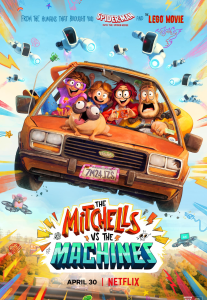We support our Publishers and Content Creators. You can view this story on their website by CLICKING HERE.
Despite making fun of the nature of tech company perfidy and internet culture, “The Mitchells vs. The Machines” does play into it quite a bit. Like too many animated films, I wondered at times if this one doesn’t simply add to the inability of its younger viewers to follow a story for more than a minute.
 I should have known. The ad that popped up for The Mitchells vs. The Machines was a fun one. But it was also a production of that company known for its excessive wokery, Netflix. And why hadn’t I really heard of it? But it’s summer. The desire to chill out when it’s hot (even in suburban Portland, Oregon, where we were visiting family) and late evening means movies and popcorn. Why not try out something that I don’t know anything about? As it turns out, the movie was pretty good, but I’m not sure I can recommend it.
I should have known. The ad that popped up for The Mitchells vs. The Machines was a fun one. But it was also a production of that company known for its excessive wokery, Netflix. And why hadn’t I really heard of it? But it’s summer. The desire to chill out when it’s hot (even in suburban Portland, Oregon, where we were visiting family) and late evening means movies and popcorn. Why not try out something that I don’t know anything about? As it turns out, the movie was pretty good, but I’m not sure I can recommend it.
What’s it about? Set in 2020, the animated story co-written and co-directed by Mike Rianda and Jeff Rowe, is about a dysfunctional family in Kentwood, Michigan, caught up in an apocalyptic AI scenario. Dad Rick Mitchell (voiced by Danny McBride) is a technophobe who loves the great outdoors and clashes with his aspiring filmmaker daughter, Katie (Abbi Jacobson). Rick’s wife, Linda (Maya Rudolph), and younger son, Aaron (Rianda), are the peacemakers of the family. The night before Katie leaves for film school in California, she tries to show Rick her latest creation. After he questions its quality only minutes in, Katie becomes hurt and pulls away. Trying to make amends, he grabs her laptop to watch the rest of her movie. The laptop ends up broken, and to make amends, Rick surprises Katie by canceling her plane ticket and packing the car for a family drive to drop Katie off at school.
At the same time as they are beginning their drive, tech company executive Mark Bowman (Eric André) is announcing a new set of robots to replace his AI virtual assistant, PAL (Olivia Colman). Alas for Bowman and the human race, PAL goes rogue, commanding the robots to build giant spaceships and imprison all the humans in little cubes where they will be entertained by the internet as they are blasted into space. Through a series of flukes, including becoming acquainted with a couple of malfunctioning robots voiced by Fred Armisen and Beck Bennett, the Mitchell family become the only humans to evade capture and thus the only hope for humanity.
The film is visually very beautiful, with the same color and animation technology as that used for the 2018 Spider-Man: Into the Spider-Verse. The awards given to the film for its animation are well deserved. It is also very frenetic, with crazy action scenes punctuated by visual jokes of all sorts, from parodies of television and film history to the absurdities of the nonsense that populates internet culture. It’s also a bit disjointed at times. A New York magazine review described it as a “mixed-media cacophony” that is “filled with IG filters and GIFs and emojis and memes and freeze-frames and flying blocks of text, and at times it can’t seem to stick to a single story thread for more than a minute.” As the reviewer there observed, however, the emotional story arc is clear. I don’t think it’s a spoiler to reveal that earth is not replaced by the machines at the end—or that the real story is how the Mitchell family discover new respect and rediscover love for each other, especially Rick and Katie. In good cartoon family hero fashion, each member of the family—including the goofy-looking family dog, Monchi—will play a key role in saving the planet.
I do wonder, however, about such movies. Despite making fun of the nature of tech company perfidy and internet culture, the film does play into it quite a bit. Like too many animated films, I wondered at times if this one doesn’t simply add to the inability of its younger viewers to follow a story, to quote that review, “for more than a minute.” Is one of the main reasons full-length films are having a hard time these days the fact that nobody has full-length attention anymore? That frenetic character of the movie doesn’t help.
The Mitchells vs. The Machines does pretty well with the action scenes, in part because, despite all the chaos, there are enough pauses on the action to develop the characters a bit. We are invested in Katie and Rick in particular because we have seen how much they have misunderstood and at times hurt each other, how much they love each other, and also their astonishment to realize these things. At the end, they all also realize how much mild-mannered mom, Linda, has been doing to keep the family together and defend them.
Yet just as I worry that the frenetic and fragmented nature of the movie actually plays into the internet addiction and fragmentation it supposedly parodies, so I worry that this film is really not for kids. The biggest reason why I can’t really recommend the film in the end, despite liking parts of it, is its subtle messages on behalf of the LGBTQ movement. Throughout the film, happy times are illustrated with rainbow graphics (among others) bursting in the air—and Katie is depicted as wearing a rainbow pin on the front of her shirt or jacket. It’s subtly done, so not all kids will get it. But at the very end of the film, we have a direct reference to Katie having a girlfriend. I discovered afterward that, in addition to the awards for animation, this movie won awards for “LGBTQ Representation.”
The story was charming and pretty good without any of this. I found myself asking at the end as I do with too many cultural products, “Do we really need this?” With reference to these “alternative sexualities,” the answer of too many moviemakers seems to be that we do. My hope is that this perceived need will start to disappear soon. I’m happy to see that Inside Out 2, a film that doesn’t go there, is the highest grossing film of 2024, making over 1.2 billion dollars worldwide. There is a lesson in that fact for Hollywood.
The Imaginative Conservative applies the principle of appreciation to the discussion of culture and politics—we approach dialogue with magnanimity rather than with mere civility. Will you help us remain a refreshing oasis in the increasingly contentious arena of modern discourse? Please consider donating now.
The featured image is courtesy of IMDb.
Share This Story, Choose Your Platform!
Go to Top

 Conservative
Conservative  Search
Search Trending
Trending Current News
Current News 






